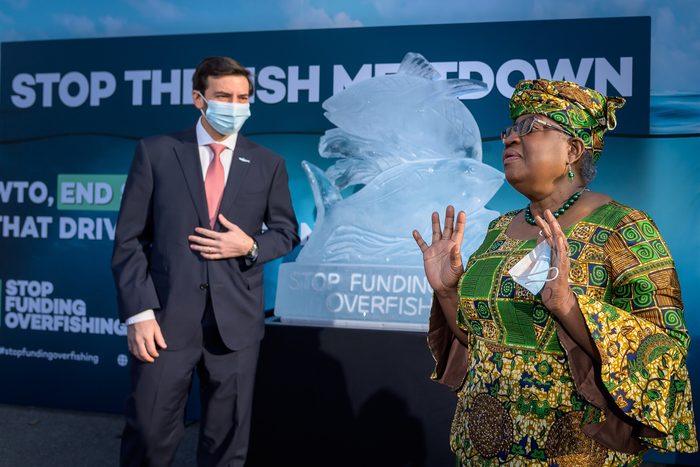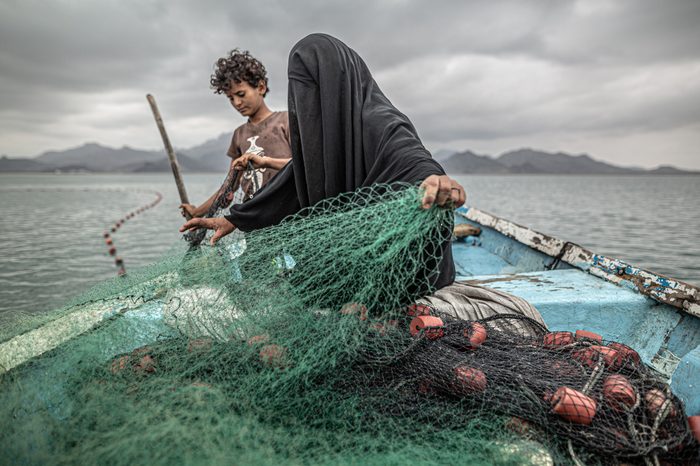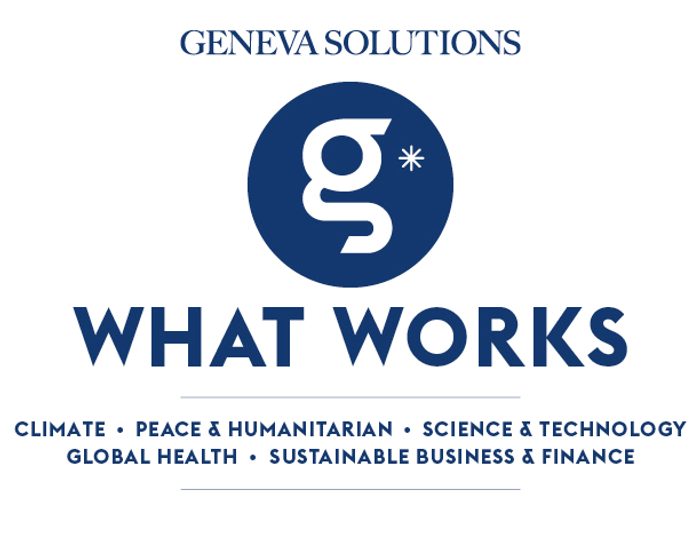Good morning, it's Kasmira, and today we're looking at what to expect as a new round of negotiations to stop over-fishing kicks off in Geneva this week.
In other news, the UN has adopted a new framework that accounts for nature’s contribution to economy. And with debt crises posing a growing threat to many economies, now's the time for investors to align their goals with those of the SDGs, says one Geneva expert. |
|
Sustainable business & finance news
|
|

WTO director-general Ngozi Okonjo-Iweala, right, with chair of the fisheries subsidies negotiations Ambassador Santiago Wills next to an ice sculpture presented on 1 March by NGOs requesting urgent action to finalise the fisheries subsidies deal. (Keystone/AFP POOL/Fabrice Coffrini)
|
|
🐟 Fish talks.
The next round of negotiations to forge a fisheries deal to ban harmful subsidies will kick off at the WTO this week. There's hope that Dr Ngozi Okonjo-Iweala's leadership will help drive new impetus to complete a deal before the ministerial conference MC12 at the end of the year.
Geneva Solutions (EN)
|
|
🏗️ A Covid recovery aided by SDG-linked investments.
With the pandemic pushing more countries into debt distress, it’s now that investments linked to the sustainable development goals (SDGs) are needed the most, says Geneva-based advisory firm The Ground_Up Project’s Steve Rocco. He makes the case for how investors can leverage country SDG plans and contribute to building more resilient economies.
Geneva Solutions (EN)
|
|
|
Eliminating all harmful fisheries subsidies
could result in an increase of 12.5 per cent in global fish biomass by 2050, according to a model developed by researchers at the University of California, Santa Barbara, and funded by The Pew Charitable Trusts. That number translates into nearly 35 million metric tons of fish—almost three times the entire continent of Africa’s fish consumption in a single year.
SubsidyExplorer (EN)
|
|
Here's what else is happening
|

Pablo Tosco's Yemen: Hunger, Another War Wound, Yemen, 12 February 2020 (Credit: Pablo Tosco/World Press Photo/Keystone)
|
|
Pandemic, conflict, social justice: award recognises photojournalists documenting unprecedented year.
Argentinian photo-video journalist Pablo Tosco captures Fatima and her son prepare a fishing net on a boat in Khor Omeira bay, Yemen, as they try to rebuild their lives devastated by armed conflict in Yemen. Although her village was destroyed, Fatima returned to resume her livelihood, buying a boat with money she earned from selling fish. The conflict in Yemen has led to what UNICEF has termed the world’s largest humanitarian crisis. Tosco is one of the nominees of this year's World Press Photo prize, one of the highest accolades in photo journalism.
The Art Newspaper (EN)
|
|
|
GS news is a new media project covering the world of international cooperation and development. Don’t hesitate to forward our newsletter!
Have a good day!
|

|
|
Avenue du Bouchet 2
1209 Genève
Suisse
|
|
|
|










